Learn how to flip a foreclosed house in this in-depth article and resources below. You will find lots of useful information here along with answers to detailed FAQs about flipping foreclosed houses.
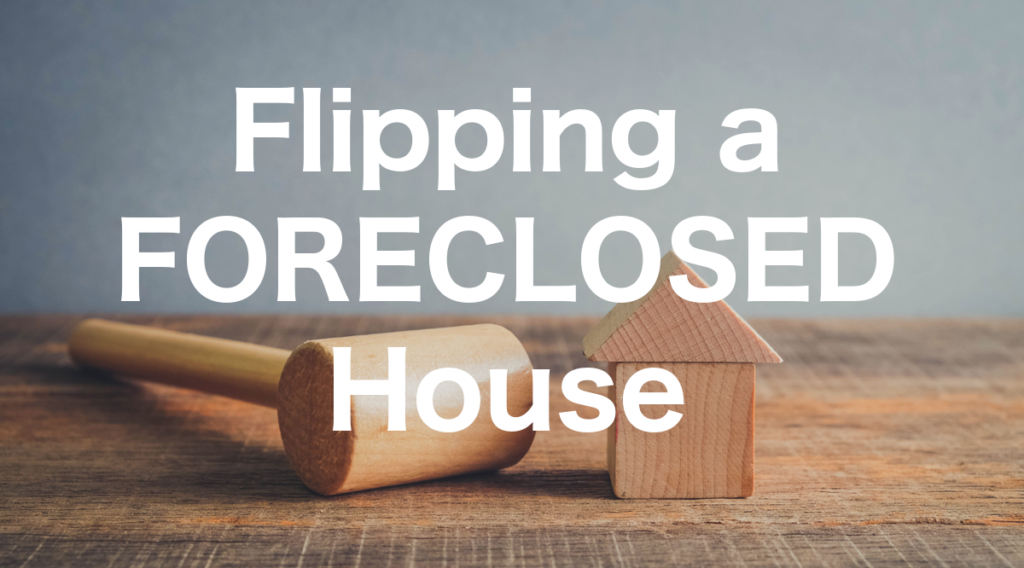
Before we get into the nitty-gritty details of foreclosures and how to flip foreclosed properties, let’s lay the groundwork.
What is a Foreclosure?
A foreclosure is a formal legal process whereby a lender or other creditor forces the sale of a home to recover past due payments owed by the homeowner.
The reasons for a foreclosure can include past-due mortgage payments, property taxes, condo association fees, or court judgments.
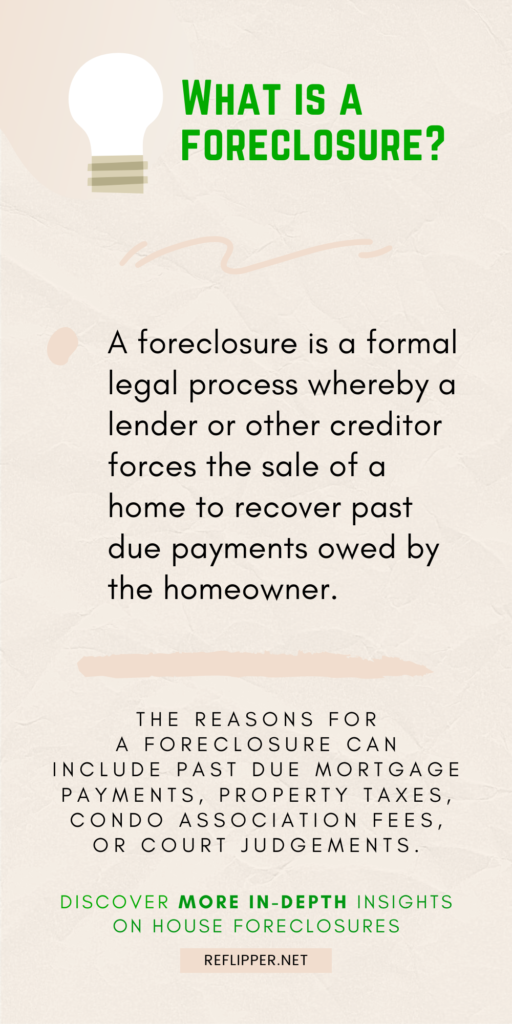
A foreclosure action can be brought against the homeowner only by a creditor with a secured interest in the property. These creditors include banks, insurers, government agencies, tax authorities (IRS, county or city assessors), condo associations, and courts.
The House Foreclosure Process
Foreclosures follow a structured step-by-step process over time. This involves four stages:
- Pre-Foreclosure
- Foreclosure Judgment and Notification
- Foreclosure Auction
- Post-Foreclosure
 1. Pre-Foreclosure Stage
1. Pre-Foreclosure Stage
Pre-Foreclosure begins on the date when the homeowner falls past due on his or her payments to the creditor. The creditor will send past due notices, escalate with phone calls and potentially involve a collections agency. This Pre-Foreclosure period can last months or years. It can involve partial payments, loan modifications, and negotiation.
2. Foreclosure Judgment and Notification
Foreclosure Judgment and Notification is the next step. The creditor must issue a final written notice to the homeowner (aka “Notice of Foreclosure Action”).
In many locations the creditor must bring a foreclosure action and obtain a court judgment that authorizes the creditor to foreclose on the property. In other situations (i.e. a tax lien action) a court judgment may not be necessary. If a formal judgment is obtained the creditor usually files it with the County Recorder.
Many states have a “cooling off” period after the foreclosure judgment is obtained. After the homeowner is formally notified, the creditor cannot take further action for a specified amount of time, usually 30-45 days depending on the jurisdiction. This allows additional time for the homeowner to cure the delinquency before losing his or her home.
Assuming the homeowner does not find the money or otherwise negotiate out of the situation, the creditor will then advance to the next step.
| FIND FORECLOSURES – Buy real estate up to 50% off at Foreclosure.com |
3. Foreclosure Auction
A Foreclosure Auction occurs next. The creditor takes the foreclosure judgment and related documents to a third party to auction off the house. Foreclosure auctions are open to the public, and the property is sold “as is” to the highest bidder.
In some places the county Sheriff is responsible for selling these properties at a sheriff’s auction. In other jurisdictions, a private auction company runs the auctions. Foreclosure auctions are usually held at the courthouse, city building or other convenient public location. In some rural areas the auction is held at the property itself. Many creditors will also auction foreclosed houses through online auctions.
If the house is sold at auction the auctioneer issues a bill of sale and the deed to the new owner. It can take a week or two to get title documents after a house foreclosure auction. The new owner records these documents at the County Recorder and proceeds to the next step.
If the property does not sell at auction for an amount at or above the creditor’s minimum threshold (aka “reserve”), then the creditor has two choices. It will either try to auction it off again in the future, or purchase the house by “buying” it at the auction. In the latter case, the creditor essentially redeems the mortgage or lien and receives title to the property in return. The house becomes “real estate owned” (REO) and belongs to the creditor.
After a foreclosed house is sold at auction, any positive balance above the sale price, minus foreclosure expenses, must be returned to the homeowner. This is handled by the auctioneer.
4. Post-Foreclosure Stage
After the new owner wins the auction and records the sale and title documents, he or she can take possession of the property. This may require evicting the previous owner, tenants or squatters. Eviction may require a separate formal legal process. The new owner should immediately insure the property against damage or loss at this point.
Depending on the location of the property and the type of creditor who foreclosed, the house may or may not come out of the foreclosure auction with a clean title. Second mortgages, mechanics liens, etc. may or may not be eliminated by the foreclosure auction process. It is essential for foreclosure auction buyers to understand the specific laws and parties involved. Otherwise, the new buyer may face hidden creditor claims after winning the auction.
Finally, once the new owner has taken possession of the foreclosed house he or she can begin to rehab it for rental or flipping
Who Buys House Foreclosures to Flip?
In principle, anybody with the necessary cash can purchase a foreclosed house at auction. However, it’s rarely this simple.
Cash Buyers Dominate
Foreclosure auctions require immediate payment in full of the winning bid price, either in cash or cashier’s check. Buyers of foreclosed houses at auction must be well-funded with ample cash on hand. Most house flippers tend to use a combination of their own funds and hard money loans.
Foreclosure auctions are also attended by large investors and their representatives — especially in major urban markets like Los Angeles, Denver and Miami. The competition for good properties can escalate quickly, with deep pocket investors winning most bids.
In smaller markets competition is generally less for foreclosed houses. Individuals and small private investor groups tend to be the main auction buyers in these markets.
Foreclosure Auctions Are for Risk Takers
An essential element of success in flipping foreclosed houses is knowing how much to pay. Overpaying at auction can severely limit profits on a flip because most properties sold at auction are run down and may require extensive repairs. They may also come with costly title issues and liens that must be cured before the house can be sold.
These factors make flipping foreclosed houses risky. Buyers must be savvy about the property market, the bidding process, and pricing distressed properties.
Time is also a factor — winning the auction is only the first step to flipping these houses profitably. These houses generally must be rehabbed — sometimes extensively. Buyers often need to evict occupants from the houses they buy, and having an experienced lawyer to help is necessary.
Given these complexities, flipping foreclosed houses is not for beginners. That being said, there are big profit opportunities for house flippers who can buy low and manage the risks.
Who Sells Foreclosed Houses?
Foreclosure auction sellers in the housing market are quite diverse. In the U.S. there are hundreds of Federal, state, county, local and online auctions every week.
Some of the largest foreclosed house sellers are Federal government entities including the Internal Revenue Service (IRS), Department of Housing and Urban Development (HUD), Small Business Administration (SBA), Fannie Mae (FNMA) and other agencies. The Federal government auctions houses to recover back income taxes, loans and mortgage insurance payments it made to defaulted homeowners.
Banks, insurers, courts, condominium associations, and tax assessors all auction off foreclosed houses. These auctions are held to pay back mortgages, court judgments, child support, criminal fines, condo association dues and property taxes.
Should You Flip Foreclosed Houses?
Foreclosure auctions can be a great source of undervalued houses, but flipping foreclosures comes with big risks. These factors will help decide if this strategy will work for you.

Pros of Flipping Foreclosed Houses
- You can buy houses at substantially discounted prices
- Lack of competition
- High ROI potential
- Good for flippers with strong legal and rehab/construction skills
Cons of Flipping Foreclosed Houses
- Foreclosures can come with big legal and tax surprises
- Estimating rehab costs is difficult (limited opportunity to inspect properties before buying)
- The excitement of auctions can lead to overpaying if you’re not disciplined
- It’s more complex and risky than flipping other properties
- It requires lots of cash
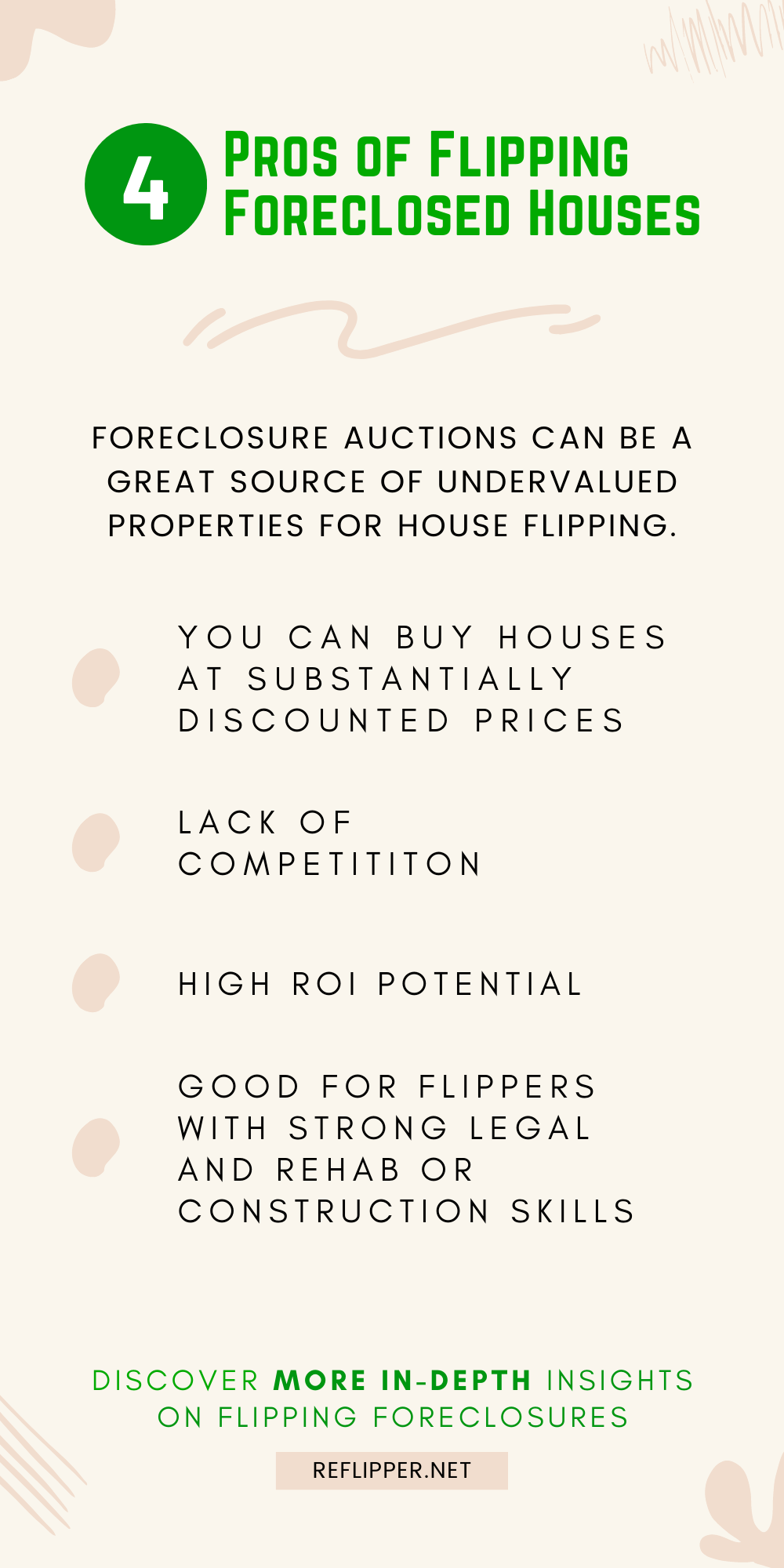
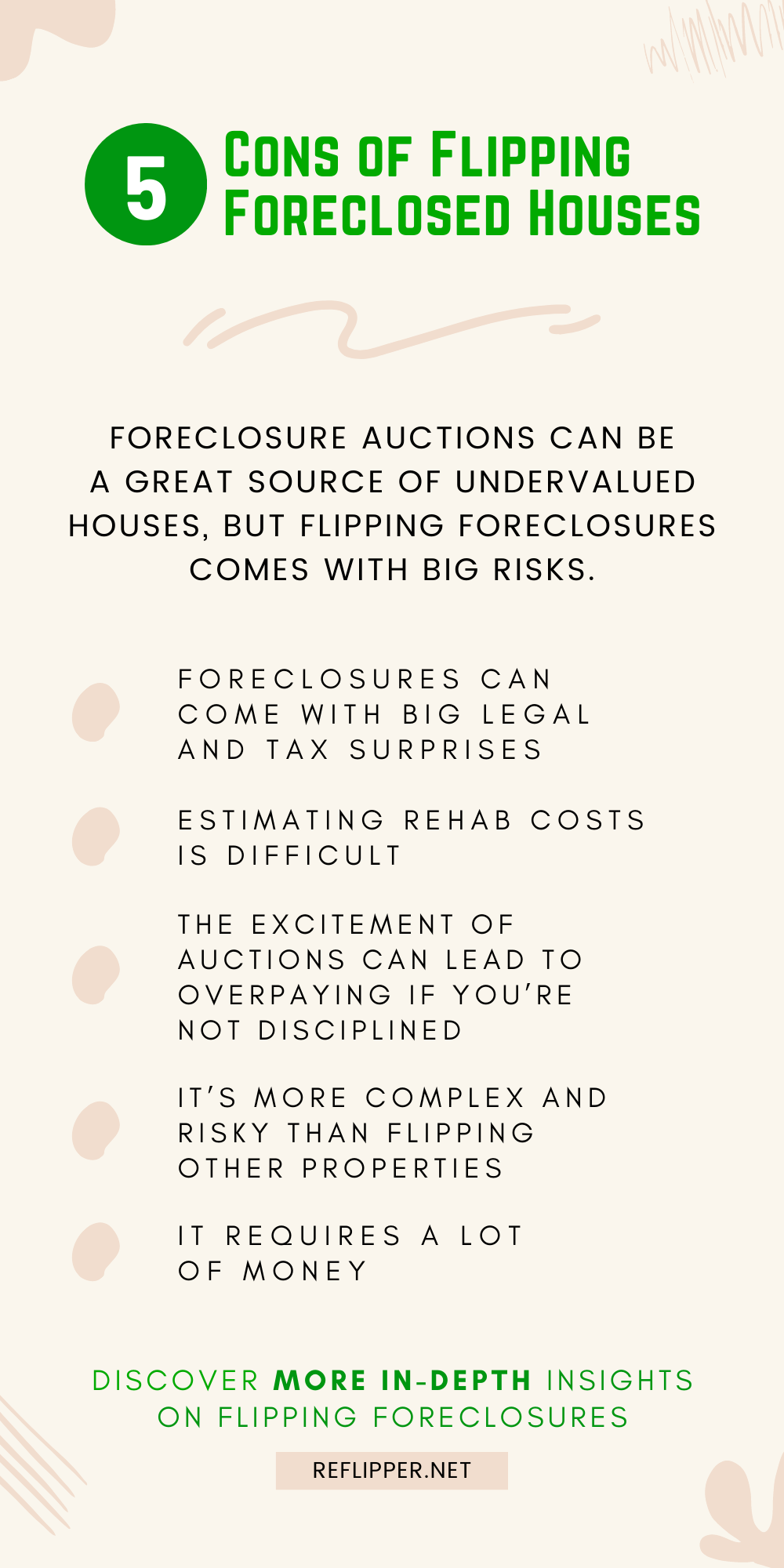

Finding House Foreclosure Listings
There are quite a few ways to find house foreclosures:
- Local newspaper real estate or classified sections often have foreclosure listings.
- Some real estate agents specialize in foreclosures and real estate owned (REOs).
- Drive around distressed neighborhoods with lots of foreclosed properties looking for signs indicating a quick sale, bank repo or foreclosure.
- Banks often list their bank-owned properties in the real estate owned (REO) section on their websites, or you can call them directly.
- Government Agencies like the U.S. Department of Housing and Urban Development (HUD), Fannie Mae, IRS, and the Small Business Administration (SBA) all have government foreclosure listings.
- Auction house websites often list their current inventory.
- Foreclosure listing services charge subscription fees to find foreclosures and make them available. This can be a huge time-saver.
- Courthouse listings (or judgments) are often a good source of recent foreclosures. You may also be able to contact the parties before the courthouse auction and make a deal.
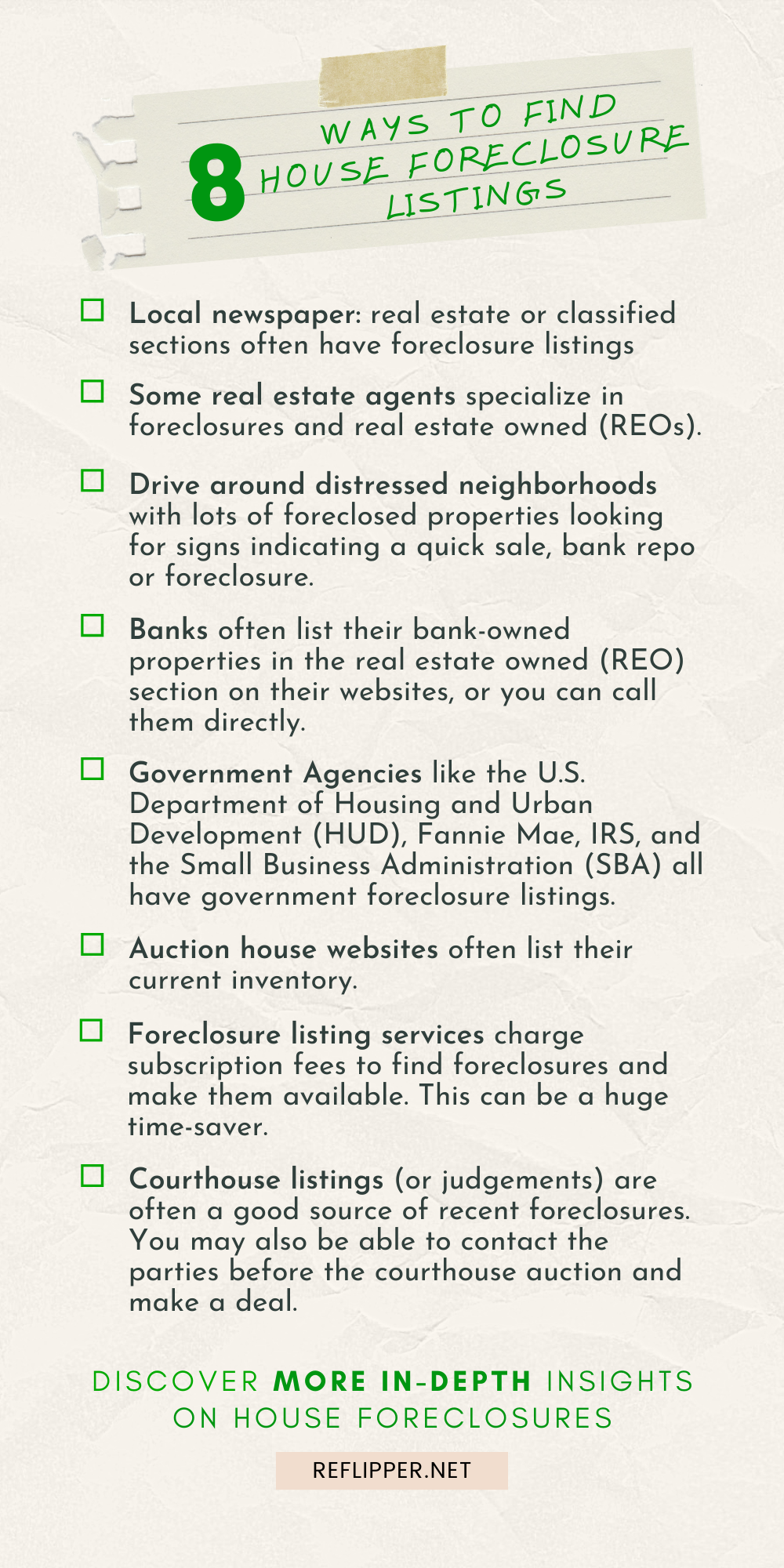
Read more about getting foreclosure listings with minimal time and cost here >
Learn how to find government foreclosures to flip here >
Finding a House to Flip at a Foreclosure Auction
Attending a foreclosure auction is often a good place to start when you’re first looking into flipping foreclosed homes.
There are two types of house foreclosure auctions: courthouse auctions and online auctions.
To find a courthouse auction, you’ll need to visit the Federal agency, county, or town website to find when and where the next auction is scheduled. If the website doesn’t have that information, you will need to visit or call and ask the clerk for the auction schedule.
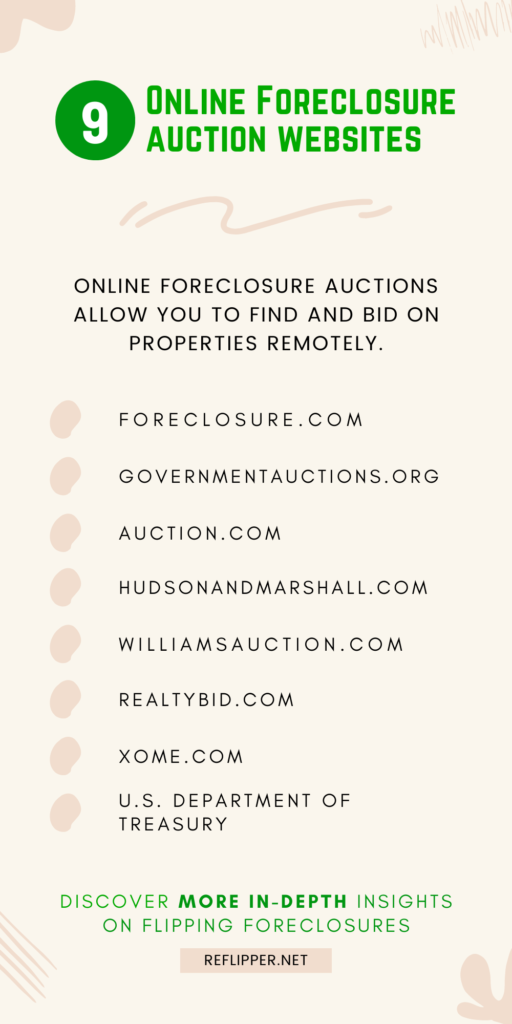
There are a number of websites where you can find and bid on foreclosed homes:
- Foreclosure.com
- GovernmentAuctions.org
- HubZu
- Auction.com
- Hudson & Marshall
- Williams & Williams
- RealtyBid
- Xome
- U.S. Department of Treasury
Learn more about how to find house foreclosure auctions here >
How To Buy a Foreclosed House to Flip
How to buy a house at a foreclosure auction depends on the auction location and type.
For courthouse auctions, the local rules and regulations govern the process. These are often attended by professional buyers and the auction process can be very short — an hour or less in some cases — with cash payment due on the spot. You will need to do your homework, know what properties to bid on, and be ready with the money if you win.
For online auctions, the auction house (or government entity running the auction like the IRS) determines the process. You need to be familiar with the rules, how to bid, when and how payment is due, be properly registered as a bidder, and have adequate deposit or connected accounts already established. Since the properties may not be available to inspect locally, all you have to go on is photos. It’s best if you can hire a real estate or construction professional to inspect the property before the auction — even a cursory inspection from the outside can uncover key information you need to bid accurately.
Learn more about buying house foreclosures at auction here >
Flipping a Foreclosed House With Zero Cash
Lack of your own cash is NOT a barrier to buying and flipping a foreclosed house using auctions.
To bid and win at a house foreclosure auction you generally need a large amount of cash on hand. This is particularly true with courthouse auctions. Online auctions tend to have a longer payment period, but it’s still short enough to make financing the purchase a challenge.
You can use several sources of cash to buy homes at auction:
- Hard money lenders
- Peer-to-peer lending sites
- HELOCs or credit cards (these should be refinanced quickly to avoid high-interest rates)
- Life insurance policies
Learn more about buying a foreclosed house at auction with no cash here >
How to Avoid Losing Money at a Foreclosure Auction
Auctions can be tricky. It takes a lot of experience to avoid losing money on foreclosure auction houses. It is crucial that you try to find out as much as possible about a foreclosed house BEFORE bidding at auction. Buyer beware!
There are three things you MUST know before buying a house at auction:
- Any construction issues with the property
- The 90-Day Flipping Rule
- The foreclosure auction rules and dynamics
Learn more about these 3 keys to avoid losing money in a house foreclosure auction here >
Foreclosure Auction Flipping FAQs
You can read all our foreclosure articles here >
- Who can bid at a foreclosure auction?
- When is the best foreclosure auction time of year?
- Who is involved in a foreclosure auction?
- What are the risks of a foreclosure auction?
- Are auction homes cash only?
- What is a sheriff sale auction?
- What happens if a foreclosure auction is postponed?
- Can you purchase a foreclosed home without attending a foreclosure auction?
- How to finance a foreclosure auction purchase?
- What is a HOA foreclosure auction?
- How to pay after winning a house foreclosure auction?
- Is it better to buy houses at foreclosure auctions when the market is rising or falling?
- Difference between a foreclosure auction and REO?
- Can you get a mortgage on a house bought at a foreclosure auction?
- Can a contractors lien cause a house to go to foreclosure auction?
- What types of properties can you buy at a foreclosure auction?
- What happens after winning a foreclosure auction?
- Foreclosure auctions – what if the homeowner files bankruptcy before the auction?
- Foreclosure auctions – does a quitclaim deed give clear title?
- What is the difference between a courthouse vs. online foreclosure auction?
- How do I investigate foreclosure liens?
- What is the best foreclosure auction bidding strategy?
- How to flip REO properties?
- How do I buy a short sale from the homeowner?
- States with right of redemption?
- Who can exercise the right of redemption?
- Worst mistakes when flipping a short sale house?
- Acquire foreclosed houses by buying right of redemption?
